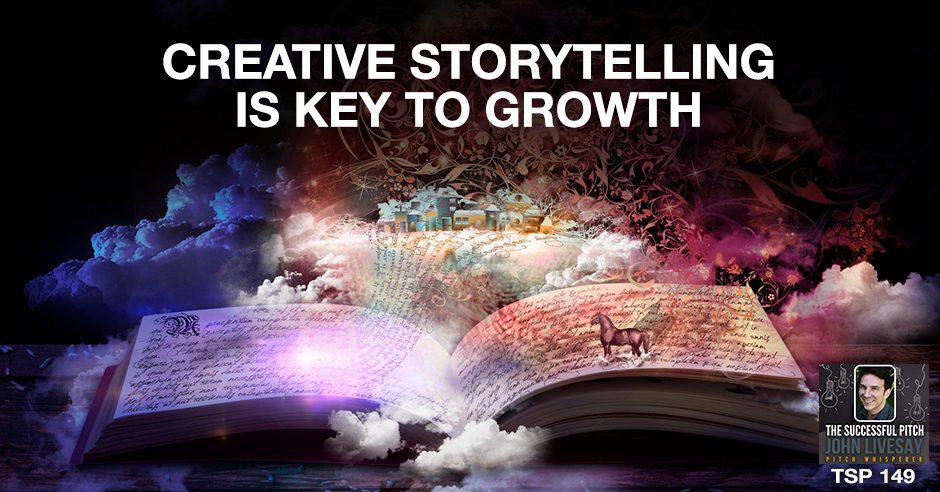Creative Storytelling Is Key To Growth with Anton Zietsman
Posted by John Livesay in podcast0 comments
 Episode Summary:
Episode Summary:
The easiest part of the business is having the idea. The more challenging part is bringing life to that idea and finding the right people to help you do it. Director of 3311 Ventures Anton Zietsman adds that a company needs the ability to transition from the founding members to the expansion team that will develop culture and that will promote high and hyper growth. However, before all of these, founders need to develop the ability of creative storytelling as well as developing deep working relationships. Learn how strategic partnerships can provide capital and future leverage.
—
Our guest is Anton Zietsman who works at 3311 Ventures as part of the core team finding entertainment startups to fund. One of those companies is Donut Media, which creates video content to entice millenials to be interested in the automotive industry since a lot of millenials are not keen on buying a car right away. He talks about what it takes to be successful both as an entrepreneur and as someone who’s pitching and has the ability to execute he said is much more important than whatever your idea is. You need to have great communication skills, be strong on juggling a lot of different things competing for your time and most importantly keep the quality up in everything you do. Enjoy the episode.
Listen To The Episode Here
Creative Storytelling Is Key To Growth with Anton Zietsman
Our guest is Anton Zietsman who is serving now as the Director of 3311 Ventures where he manages the day-to-day operations of that fund. That fund has some unique things that you’re going to want to hear about. Before joining 3311, Anton worked at Homejoy Inc. and Goldman Sachs. He has his degree from Stanford. Welcome to the show.
John, it’s good to be here.
You and I met when I was moderating a panel and you were so well-spoken and able to show a lot of empathy for founders seeking funding that I wanted to have you on the show to share your expertise and your insights. One of the things I love to do is ask my guest to take us back to their own personal story of origin. Someone like you graduating from Stanford has a lot of choices. Did you know right from the get go, “I’m going to go into this world of investments?”
I didn’t. Initially, what I wanted to do and what I was passionate about was politics. That’s why I studied political science and economics at Stanford. The goal was to get involved on the public side of things and ultimately pursue a career in politics, however loosely defined that was for me in the early days. What ultimately ended up happening is I joined a program called Stanford in Washington, which sends students to D.C. for about three months and places us in a government internship while we live and learn and involve in the city. I worked for the Treasury Department for about three months in the Department of International Affairs in the office for the Western Hemisphere. This was about 2010, which is right towards the latter half of the financial crisis where Dodd-Frank was being implemented and a lot of reforms were being pushed through when it comes to domestic finance side of things. I came away with two realizations from that internship. One was that government sector work was probably not for me, a little on the slow side. While there were great people at Treasury Department, I didn’t get that urgency and that piece of work that I was longing for. The second one was that domestic finance was where all the change and all the excitement was, at least at the time of the Treasury Department. That’s when I started to change my focus and started looking at internships on the private side and looking at finance work. That’s ultimately what led me to Goldman Sachs.

Creative Storytelling: Having the idea is almost the easy part of the job.
What was that like? Goldman Sachs is certainly well-known and prestigious and so is Stanford, but they don’t take anybody who wants to work there.
No. For me to go an opportunity to work with a group of likeminded and to work on a faster pace and on subject matters that I was passionate about at the time, which was global economies and the companies operating within them. That’s how I found my way to Goldman, which was an incredible experience from a skill set and personal development perspective. For me, it was a great couple of years learning the tools that I still use today and building a network of pretty impressive people.
What kind of tools did you learn that you still use today?
It’s mostly around the ability to be effective within a corporate or business setting. It sounds a little loosey goosey but what the biggest takeaways from Goldman is the company teaches you how to be effective, how to be a good communicator, how to manage competing workflows, how to manage tight deadlines, and do so while maintaining a high degree of rigor when it comes to the quality and the excellence of your work. In terms of transferability, that’s one of the greatest things that I took away from that experience. On top of that, there’s all the industry specific knowledge when it comes to how companies run and operate, how companies are capitalized, how they raise capital and evolve through their lifecycle. For me, all that was just a bonus.
What I find fascinating is that the ability to communicate well, the ability to deal with competing projects demanding your time and keeping the quality of everything up is exactly what it takes to be a successful entrepreneur as well as what it takes to be successful at a big corporation like Goldman Sachs. Are those the kinds of qualities you’re looking for and the founders that you and your team decide to fund when you hear a pitch?
That’s part of it. The DNA of a successful entrepreneur tends to be very different from the DNA of someone who is going to be a highly successful corporate student. There are certainly aspects of those qualities that are transferable, the ability to be tenacious, the ability to communicate effectively to really paint a vision, the ability to execute is incredibly important. Having the idea is almost the easy part of the job. What’s a lot harder is the ability to go out and bring it to life. What I see as being the main difference is that successful entrepreneurs and the ones that we look for have a big component of rule breaking, of being rebels on some level that you won’t necessarily find at a higher-level corporation. That’s something that’s important. It’s easy to say that the best startups have been the ones that came in and disrupted existing industries and have thought about industries in a new way or created new industries in of themselves. That’s the X factor that differs when it comes to entrepreneurs and something that we try and identify when identifying the companies to invest in.
[Tweet “The ability to execute is even more important than the idea.”]
People get so married to their idea and realize it’s probably going to pivot and it’s your ability to execute that is what the investors like you are looking for. Take us to what made you want to leave Goldman and go to Homejoy.
It was a combination of things. The most important one though is companies like Goldman are successful at what they do because they’ve built a structure in which they’re able to basically churn out junior employees on an annual or biannual basis and maintain their level of excellence. While that may be great for the firm and it may be great for the firm’s clients, what it means is an individual contributor within those companies is that you’re cog in a much larger wheel. Part of what I wanted to do was to be a lot closer to the underlying business. I wanted to be in an operational role in a smaller company in which I was able to come in and impact the underlying operations. That translated into a startup. I was intrigued in the world of high-growth companies, which at the time, a lot of which were in the on-demand space. That’s ultimately the experience that I was seeking. Through a connection at the right network, I was able to land at Homejoy.
What are some of the things that you learned at Homejoy that relates to operations that you think would be valuable for the audience to make sure they’re doing to make sure that their startup is operating at its peak level?
I spent a little under two years there and there are so many lessons learned, so many things that I picked up along the way that would be valuable. Ultimately, part of what was most striking to me is the importance of the team that you build and the culture that you develop over time, particularly when you’re dealing in a high growth or hyper growth situation like Homejoy. One of the challenges a lot of entrepreneurs’ face is how do you scale the team, how do you up level the team at the right time. One of the hardest things to do is moving forward or moving ahead from the founding team and bringing on more experienced executives and timing that in a way that makes sense for the business. That was one of the very interesting lessons and experiences that we had to go through and figure out when to reach out for the right kind of expertise and bring it on board. The second thing is just obsessing about the consumer and the consumer experience. It depends on the business not the industry. It’s understanding who the customer is, why they’re using you and being laser-focused on improving that experience. For us at Homejoy, that was both sides of the marketplace, both the client and the service provider, and understanding who the key constituencies are and keeping them conscious on top of mind throughout the development cycle of the company is critically important.
You’ve got so many other things trying to grab your attention, but if you focus on that, you’re most likely continue to keep them loyal and get new ones. This concept of the culture evolving from just a few people to now realizing, “Is it too soon or too late to hire somebody? Are they a good fit with our culture?” Sometimes the founders might be a little intimidated by people that are coming in with a skill set that they don’t have but need. Do you ever see that in the teams that you’re watching and funding?
[Tweet “Team and culture are the keys to growth.”]
It’s a problem that young companies face all the time. It’s important to get comfortable with that level of unease and on the contrary, seek out that unease and try and be honest about what the skill set of the founder is, what the skill set of the team is and understand what your blind spots are, what your goals are, and going out there and finding someone who is smarter than you when it comes to those things. Who’s going to be able to instantly or very quickly start pulling their weight and educate you and educate the rest of the company when it comes to that domain. It could be anything. It could be sales. It could be marketing. It could be branding. It could be operations. The best founders that we see have a high level of self-awareness when it comes to where they need help and are comfortable seeking out and convincing people to join them that can help them.
That brings us to 3311 Ventures. Do you know the story of origin, by chance, and why the company is called 3311?
3311 comes from the two numbers from our founders’ favorite baseball players. That’s where it comes from. 3311 Productions, which is our parent company, was founded in 2011 primarily as a film finance and production company. Over the years, it grew into a more diversified entertainment company that now does scripted TV and unscripted TV as well.
I’ve interviewed a lot of Angel investors, VCs, family offices, etc. A lot of people are not expertise in funding television, scripted or unscripted or films. That’s the kind of startup you’re looking for or a startup that has something that can help disrupt the entertainment business, is that right?
Our focus and the way we look at the landscape can be summarized this way. We look for companies in which we can not only come in and provide capital but also be strategic in terms of our partnership. When we think about that there are two things that we’re good at as an overall company. The first is storytelling, content creation, video production and distribution. The second is over the course of our existence of the company, we’ve developed deep relationships across the industry whether it’s with talent, agencies, networks, studios, distributors. We look for companies in which we can bring capital to the equation but also leverage one of these two core skill sets in a much more strategic way. In terms of what that translates to from a target company, we do see a lot of companies in the media and entertainment space, but we also see companies in the consumer tech, consumer econ space, in which we have the ability to get involved more in our marketing and branding perspective.
Can you give us a story or an example of someone that you said, “That was a great pitch, we want to go and do business with them?”
We currently have five companies in our portfolio and looking to add a couple more. There’s one example that I can give that will illustrate this well. We invest in a company called Donut Media, which is a millennial brand for car enthusiasts. Essentially, what they do is they create videos and distribute videos across their social platforms in a voice and tone and manner that is obviously compelling to their fans and allows them to grow their audience and establish and develop themselves as a brand and lifestyle brand. The reason why Donut was so compelling to us was through the founder and the founding team who had experience at AwesomenessTV in the capacity of creating, distributing content to this very specific audience and demographic. They also had the Premier Content creators in the car space who had made some of the more successful videos on YouTube what that featured car is. There was this genuine and incredibly authentic passion not only for the space but for their audience coupled with a long track record and expertise when it came to not only building teams and building content teams but also finding ways to distribute and grow that audience. For us, that’s the perfect mix of what we’re looking for and why we’re ultimately convinced to invest.

Creative Storytelling: We look for companies in which we can not only come in and provide capital but also be strategic in terms of our partnership.
The other thing I want to talk about is the importance of storytelling not only in the content you’re creating but also when you’re pitching. What are your tips on that?
Storytelling is not everything but it’s a big part of the process, particularly at this stage that we invest in, which is Series C to Series A. Very early stage companies. At that point, there are so few data points that we can go off and that we can use to do some of the more rigorous analysis that we would do with later stage companies. For example, when I was in Goldman, if we’re doing later stage growth or private equity, you’re ultimately betting on three things, which is the size of the market, the business plan and the team. The team plays a big role in that decision-making process, particularly their ability to paint a picture for what the company is going to look like not necessarily in the next six to twelve months but in the next six to twelve years. Investors can only spend so much time with each company and with each concept due to the volume of deal flow that we look at. The founder needs to do a lot of the legwork when it comes to painting the picture and connecting the dots for the investor and drawing them in to share their vision and see their vision and want to be a part of that process.
Your personal passion, your reason for why you love doing this, understanding who your customer is in the pitch, I have a big philosophy that the more you show an investor like you that you have empathy for the customer and you understand their problem better than anyone else, then someone like you would say, “You’re the right person to provide that solution. We’re going to get in business with you.”
That’s exactly right, especially in content companies and media companies. That has some crossover application as well in other businesses. There are a lot of people who are MBAs and make analytical judgments on opportunities that they think they can exploit. That’s certainly one way to build a business and it’s been successful in the past. When it comes to media companies and new media companies, something that we look for is authenticity and passion. Audiences have become much more sophisticated and much more intuitive when it comes to understanding if the company or the brand they’re interacting with is authentic. That’s a critical part of the equation for us is making sure that the DNA of the founders is in line with the business that they’re trying to create because it will also ensure that they’re in it for the long haul. They’re not just doing it for ulterior motives.
Let’s talk about what do you look for when you hear a pitch. Do you fund producers who want to pitch an idea for a reality TV show?
On the production side of the company, we’ll invest in feature films in the $5 to $25 million budget range. We’re very much film maker driven and chase storytellers. We have a unique voice and a unique perspective across genres. On the scripted and unscripted TV side, we do a lot more development. We’ll take stories. We’ll take ideas. We work with writers to develop a concept and we’ll go out and will pitch that to the universe of buyers whether it’s your traditional guys like HBO or Netflix or non-traditional guys like YouTube brand or some of the new entries in this space. On the venture side, we purely look for companies. We invest in companies that have an existing team and existing products. From that perspective, it’s much less funding productions and much more capitalizing companies to go out and build a media brand for example that itself then create productions to grow its audience.
What are your thoughts on virtual reality and augmented reality as it relates to being impacting in the way we experience entertainment?
[Tweet “Be obsessed and focused on the customer experience.”]
It’s top of mind topic for a lot of investors in this space and even investors outside of the space.You see a lot of the big players up in the Bay Area are starting to spend their time on virtual and augmented reality. My perspective is it’s too early to tell. It sounds like a cop out but the way I see it when it comes to virtual reality in the entertainment space, there’s still some very real concerns that I have when it comes to the sheer ability of the experience, the distribution of devices and headsets that allow people to consume the content around the cost of creating the content, which is incredibly high today. From an investment perspective, the consumer VR space is still earlier than we’d like it to be. That said, there’s no question in my mind that that is a huge growth portion of the industry. We’ve already started to see virtual reality content being created on the gaming side and adopted on the gaming side very successfully. There’s no doubt in my mind that that’s going to happen as well when it comes to other forms of entertainment. There are just a few more things that need to fall into place before we can get excited about it from an investment perspective.
Is there a book that you would recommend people to read when they’re trying to become good storytellers or get their startup funded?
I am a big fan of founder stories or founder autobiographies or memoirs. One of the best books that I read when it came to getting a business off the ground and having the tenacity and the determination to not let yourself fail was Howard Schultz’s autobiography. Howard Schultz, the founder and CEO of Starbucks. He paints a very detailed and colorful picture about what it took him to basically get the funding for his first Starbucks store and the amount of rejection and the amount of resilience that he needed because no one believed in his idea. That’s a great inspiration. It tactically gives you a pretty good idea, a pretty good understanding of how to go to market and how to sell your vision.

Onward: How Starbucks Fought for Its Life without Losing Its Soul
The book is Onward. Is that the one you’re referring to?
That’s right. He wrote two books. It’s either Onward or the one or the one before that.
Any last thoughts you want to leave us with, Anton?
When it comes to pitching, the only thing I would say is that everything matters. What I mean by that is every interaction you have with the potential investor is a data point. Whether it’s showing up to the meeting on time, responsiveness to emails, all of these interactions creates a data bank in the investor’s mind. There are so few data points to go off of in early stage companies that we use all of these inputs as a way to make a decision. Be conscientious about that and present yourself in the best possible way even when you think you’re not “pitching” because everything counts.
I’m a big believer of that. I am so glad to hear you say that because people think, “I can just phone it in. Nobody cares about this detail.” They really do. Thanks so much for being on. You’re a great guest and I am excited to watch you and your career and all the things that your company does.
I appreciate you having me.
Links Mentioned
- 3311 Ventures
- Donut Media
- Goldman Sachs
- Stanford in Washington
- Dodd-Frank
- 3311 Productions
- Donut Media
- AwesomenessTV
- Premier Content
- Onward
Wanna Host Your Own Podcast?
Click here to see how my friends at Brandcasting You can help
Get your FREE copy of John’s latest eBook Getting To Yes now!
John Livesay, The Pitch Whisperer
Share The Show
Did you enjoy the show? I’d love it if you subscribed today and left us a 5-star review!
-
- Click this link
- Click on the ‘Subscribe’ button below the artwork
- Go to the ‘Ratings and Reviews’ section
- Click on ‘Write a Review’
- JohnLivesay.com
- John Livesay Facebook
- John Livesay Twitter
- John Livesay LinkedIn
- John Livesay YouTube
